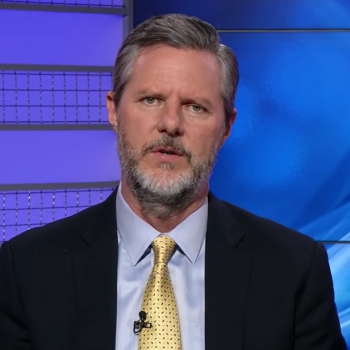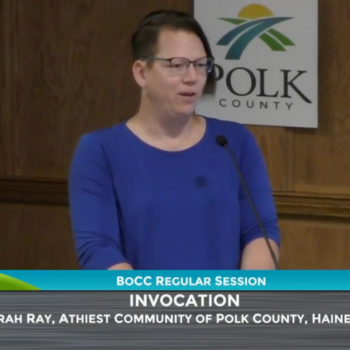Here’s an infuriating story of what Christian privilege looks like at the local government level. It involves a secular invocation that took place last night in Oviedo, Florida, and shows how Christianity often gets elevated by city councils.
First, some history: In 2015, the city council adopted a policy that allowed only city staffers to offer invocations at meetings. But over the years, local Christian pastors routinely delivered those invocations.
They soon entertained the idea of revising the policy to allow local religious leaders to speak… but, perhaps realizing that would open the door to non-Christian speakers, they decided against it. Only staff and council members delivered invocations — all Christian — over the past several months. In December, Deputy Mayor Bob Pollack even said in a meeting that, “Going forward, we all need to agree that it’s only going to be city staff [and council members] that will be providing this invocation.” That was a way to make sure outside pastors weren’t given special treatment… even though the invocations were still always Christian in nature.
But guess what? Last month, the invocation was delivered by another outside pastor. It was Dwayne Mercer of CrossLife Church, who not only offered a Christian prayer, he delivered a Bible to Jeff Boddiford, the newest member of the city council.
That’s when the Central Florida Freethought Community chose to step in; its members have delivered almost 100 secular invocations throughout the state over the past several years.
The group’s co-founder David Williamson planned to give an invocation last night — with permission from the mayor and deputy mayor — and he was also going to introduce a brand new tradition from his group: handing out copies of the Constitution to all city council members. (Take that, pastor.)
Williamson was going to give his secular invocation. Then a short while later, he’d have the opportunity to give out his symbolic reminders of church/state separation.
While the first part of that plan went as scheduled, it fell apart soon afterwards.
Here’s Williamson’s invocation:
As we prepare and assemble for this evening’s meeting, I want to encourage each of us to pause and reflect on why we’re together. We’re here to do the people’s work.
Citizens, employees, contract staff, elected officials, and guests; we’re collectively known in these settings as “We, the people.”
Thomas Jefferson wrote “that government is the strongest, of which everyone feels themselves a part.”
And because it is easy to forget, especially in the business of life and work, and so many personal and professional obligations, let’s remember that we are here to serve in the best interests of all citizens of the city, not just for those like us; not just for those with whom we agree.
This evening, and at every meeting in this sacred yet secular chamber, let’s find as many ways as possible to make all feel welcome, ensure all are heard, encourage all to be engaged. And may we remember that “we, the people” hasn’t always included those of us who think, look, love, or believe differently.
It was an excellent invocation that urged elected officials to work on behalf of everyone, not just a preferred group. Strong message! Applies to everyone!
And yet just seconds after Williamson finished that brief invocation, one of the council members, Judith Dolores Smith, chimed in with an impromptu Christian prayer of her own… as if to override the secular one she just heard.
… I’d like to go before the Creator of the universe. Our Father and our God, the God of Abraham, Isaac, and Jacob. I come to you, Lord God, asking for guidance. We just thank you, Lord God, for just hearing us and hearing me tonight. I believe, Lord God, that You’re the King of the universe, and that there’s nothing new under the sun, and all of our problems cannot be solved my man. We need your intervention. And I asked you tonight, Lord God, if You would give us wisdom as you gave to Moses who led the children of Israel out of Egypt. Give us wisdom to lead these citizens of Oviedo. And Lord God, as You promised — Your Son promised when He left this world — that You would send the Comforter, the Holy Spirit. I pray that You would send the Holy Spirit, Lord God, to heal this city, Lord God. We have been ravaged by COVID, and I just thank you, Lord God, and I thank you and give You the honor, the glory, and the praise. Amen.
What. The. Hell. Was. That.
Why did Williamson’s invocation get followed by a Christian one? When did this city council meeting become a church service? What would the reaction be if a Christian invocation was followed by a non-Christian one that’s clearly meant to undo the offense? Which policy allows for council members to offer public prayers of their own if they don’t like the one they just heard?
Smith’s actions were a slap in the face to a non-Christian speaker — and a reminder of why invocations don’t belong in local government meetings at all.
When she finished, Williamson quickly stepped back to the podium to raise an objection. It was arguably the most respectful thing he could have done in that moment, given the circumstances.
… I want to reserve my time as the invocator today to make sure that my objection to this privilege taken by the commissioner, or the council member, is noted. Thank you.
Williamson was going to spend his time in the public comments part of the meeting giving each member a copy of the Constitution, but he was so (rightfully) outraged by what happened with the prayer, he chose to withdraw that future comment and leave the meeting altogether. (Better to walk away than say something he might regret.) He is planning to return to a future meeting to voice his frustrations once he can gather his thoughts.
To her credit, Mayor Megan Sladek criticized the “second” invocation later in the meeting — albeit very mildly. She reminded everyone that invocation speakers needed to be respected and treated equally. (She didn’t name names.)
Those words mean very little, though, unless they are followed by action.
It’s clear that this city council thinks Christianity is the only religion that matters — and that even on the rare occasion when a non-Christian speaker is allowed to open up a meeting, a Christian gets the last word. That’s apparently the policy, whether or not they choose to put it in writing or acknowledge it.
Either these council members need to eliminate the invocation altogether or ensure that non-Christian speakers have an opportunity to speak without an official trying to “correct” them. If they can’t figure out an official, neutral policy, they shouldn’t be in the business of advertising Christianity at the start of every gathering. It’s not that complicated.




It’s Moving Day for the Friendly ..."
It’s Moving Day for the Friendly ..."
It’s Moving Day for the Friendly ..."
It’s Moving Day for the Friendly ..."